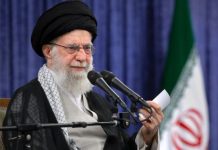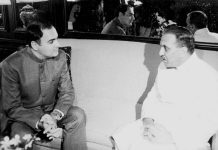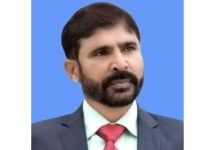By Qamar Bashir
The euphoria surrounding the first anniversary of May 9 came at a significant cost to the government. It resulted in the cancellation of the scheduled visit of Mohammad Bin Salman, the Crown Prince of the Kingdom of Saudi Arabia, which could have bolstered the government’s image and standing. Additionally, it elicited a demand from the IMF for political stability, deemed a prerequisite for financial and economic stability. This has delivered a serious blow to the already challenged government.
Drawing from my experience working in diplomatic missions abroad, first in Malaysia for four years and later in France for another four-year term, I understand that governments take into account political feedback obtained from their ambassadors overseas. Similarly, the IMF formulates its policies based on input from their local representatives.
The Ambassador of Saudi Arabia and the IMF focal person in Pakistan received numerous signals indicating a new wave of political instability and volatility, particularly following a highly charged and angry press conference by the Director General of ISPR. The PTI leadership’s total defiance in response to his demand for PTI to seek forgiveness in front of the nation, or face a refusal of dialogue, intensified the situation. This demand was seen as a direct reference to PTI and its leadership, portraying them as disruptive anarchists.
However, the press conference failed to gain the intended media reaction. Its content was forcefully refuted and rebutted by PTI, led by Dr. Arif Alvi, who had now assumed a central role and, in a way, had been declared the ambassador-at-large for PTI, tasked with clearing the path to achieve its political objectives. The resulting anti-establishment charged environment contributed to the success of countrywide rallies organized by PTI. While these rallies remained peaceful, they added to the perception of political instability.
Maulana Fazal Rehman, feeling disillusioned and betrayed by what he perceived as a promise unfulfilled, expressed his disappointment with the performance of JUI in the February 8 elections at both the central and provincial levels. Alleging interference from the “establishment” in politics, he lambasted their constant meddling and announced his party’s intention to launch a protest movement against the alleged rigging in those elections. True to his word, he initiated this movement with a rally in Karachi, adopting an assertive and defiant stance regardless of potential consequences. His direct accusations against the army, accusing them of manipulating the February 8 elections in favor of PPP and PML(N), controlling administrations across the country through apex committees, and influencing formation and dissolution of the governments, only served to exacerbate the already tense environment of political instability.
The wheat crisis has escalated, with disillusioned farmers taking to the streets and burning their crops in protest against the Federal and Punjab Governments. They accuse authorities of reneging on promises to purchase wheat at Rs. 3900 per maund, citing a lack of funds despite lavish spending on initiatives such as distributing laptops, electric bicycles, setting up mobile clinics, and running expensive advertisements.
Adding to the unrest, the Punjab government mishandled a lawyers’ agitation, resulting in the arrest of over 50 lawyers. In response, legal organizations across Pakistan launched a nationwide strike, condemning the actions of the Punjab police and abstaining from court appearances while holding protest meetings, marches, and rallies.
Meanwhile, Azad Kashmir faced its own turmoil as protests against electricity price hikes, high flour prices, and taxes entered their third day, resulting in clashes that left at least one police official dead in Mirpur and over 90 others injured across the region. The violence also caused damage to multiple vehicles, including a magistrate’s car on the Poonch-Kotli road. Markets, trade centers, offices, schools, and restaurants remained closed, while mobile phone and internet services were suspended in various parts of Azad Kashmir, including Bhimber, Bagh, Mirpur, and Muzaffarabad.
The feedback provided by the KSA ambassador to his government back home was substantial enough for MBS to delay his promised visit until the situation calmed down. Similarly, the information from the local point person to the IMF headquarters provided ample justification for demanding the resolution of political issues before proceeding with the IMF’s next three-year program.
Both the IMF and KSA were likely troubled by the allegations from PTI, election watchdog organizations, analysts in traditional media, and social media activists that the incumbent governments in the center and Punjab are illegitimate, lacking a mandate from the people and allegedly imposed by the establishment through artificial and brutal manipulation of election results on Form 47, contradicting the outcomes reported on Form 45 where they had purportedly lost. Similar claims were made by JUI, Jamaat-e-Islami, and other political parties that faced defeat in the elections. All affected parties expressed their determination to persist until the alleged electoral malpractice was rectified and the actual winners were reinstated. Should this occur, the incumbent government would be compelled to resign in total indignation.
Furthermore, the sitting government faced another damaging allegation: that since establishment is the sole factor which brought these governments in power, consequently, these governments were perceived and expected to remain under the control of the establishment, with decision-making authority stripped away from them.
Out of the two, the remarks from the IMF are more detrimental as entering into the next three-year IMF plan would unlock bilateral, multilateral, and financial institutional aid, funds, and loans to Pakistan, crucial for the country’s financial stability. Failure to do so could jeopardize even the rerolling of deposits by KSA, Abu Dhabi, and China, placing immense pressure on the government’s ability to manage its balance of payments and potentially pushing it back to a position where it was faced with the looming threat of default during the previous coalition government of Shahbaz Sharif.
We all must understand that political stability is indispensable for consistent policy implementation, investor confidence, reform continuity, credibility, and social cohesion. It ensures that economic policies are executed reliably, fostering trust among domestic and foreign investors vital for economic growth and stability and continuity of structural reforms outlined in IMF programs, preventing disruptions that could derail progress and to achieve sustainable economic development.
Without question, rather than confronting the IMF, all stakeholders in Pakistan must set aside their petty differences and inflated egos. They should engage in purposeful and sincere dialogues, aiming for sustained political stability in the country.
By Qamar Bashir
Former Press Secretary to the President
Former Press Minister to the Embassy of Pakistan to France
Former MD, SRBC

















